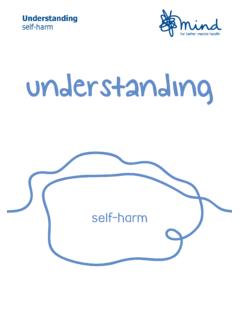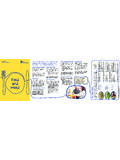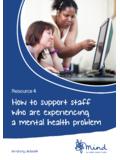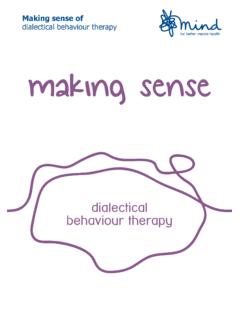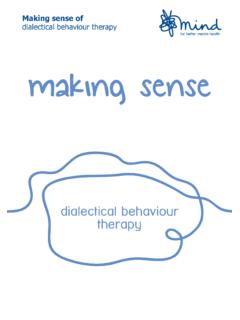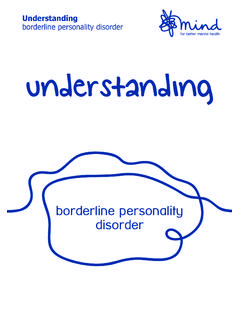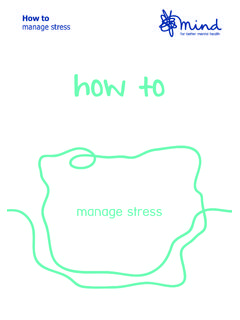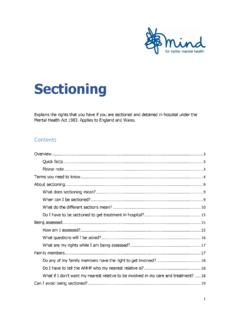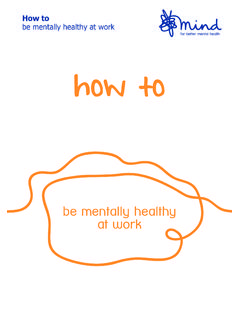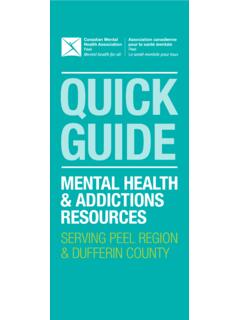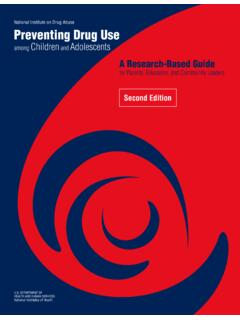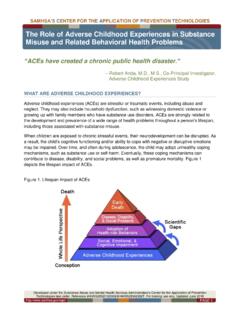Transcription of Borderline personality disorder (BPD) - Mind
1 1 Borderline personality disorder (BPD) This resource explains Borderline personality disorder (BPD), also known as emotionally unstable personality disorder (EUPD), including possible causes and how you can access treatment and support. Includes tips for helping yourself, and guidance for friends and Contents What is BPD?..2 What causes BPD?..3 What's it like to live with BPD?..4 Could my diagnosis be wrong?..7 How can I help myself?..7 What treatments can help?..11 How can other people help?..14 Useful 2 Borderline personality disorder (BPD) is also known as emotionally unstable personality disorder (EUPD). If you clicked on BPD or EUPD in our mental health A-Z then you ve reached the right page. It s your choice which of these terms you want to use, but your doctor or care team might use either. People have different views on BPD/EUPD, and it can be a controversial diagnosis.
2 But however you understand your experiences, and whatever terms you prefer to use (if any), the important thing to remember is that the feelings and behaviours associated with BPD/EUPD are very difficult to live with, and deserve understanding and support. We hope you will find the information in these pages useful when considering different options for care and support. Please do tell us your thoughts via the 'was this page useful?' button. What is BPD? Borderline personality disorder (BPD) is a type of personality disorder . You might be diagnosed with a personality disorder if you have difficulties with how you think and feel about yourself and other people, and are having problems in your life as a result. Having BPD is like the emotional version of being a burn victim. Everything in the world hurts more than it seems to for everyone else and any 'thick skin' you are supposed to have just isn't there.
3 When is it diagnosed? You might be given a diagnosis of BPD if you experience at least five of the following things, and they've lasted for a long time or have a big impact on your daily life: You feel very worried about people abandoning you, and would do anything to stop that happening. You have very intense emotions that last from a few hours to a few days and can change quickly (for example, from feeling very happy and confident to suddenly feeling low and sad). You don't have a strong sense of who you are, and it can change significantly depending on who you're with. You find it very hard to make and keep stable relationships. You feel empty a lot of the time. You act impulsively and do things that could harm you (such as binge eating, using drugs or driving dangerously). You often self-harm or have suicidal feelings. You have very intense feelings of anger, which are really difficult to control.
4 When very stressed, you may also experience paranoia or dissociation. The worst part of my BPD is the insecure I am attached to someone, they are my whole world and it is crippling. I care so deeply about how long they take to reply to an email, or their tone of voice, because I m so afraid of losing them. 3 Different views on diagnosis Because you only need to experience five of these difficulties to be given a diagnosis of BPD or EUPD, it can be a very broad diagnosis which includes lots of different people with very different experiences. Some people find it helpful to have a diagnosis because they feel it explains and helps people to understand their difficulties, or gives them a sense of relief and validation. Others feel their diagnosis isn t helpful, disagreeing entirely with the current system of diagnosing personality disorders and finding it stigmatising and unhelpful.
5 For example, some people prefer not to describe their experiences as medical problems, or would rather see them as a response to difficult life events. Our page on why personality disorder is a controversial diagnosis has more information. Even though I haven t been offered much support, just having a diagnosis helps me feel my suffering is validated. What s it like to have BPD? Have a look on our website for videos and blogs from people who are experiencing BPD. I don t necessarily tell people I have BPD because I don t like labelling myself, I just say I have depression and anxiety because it s easier. But I know I have BPD. I feel things so intensely sometimes it means I lose control of all my senses. It s one of the worst feelings, but I have learnt how to cope with it. What causes BPD? There's no clear reason why some people experience difficulties associated with BPD.
6 More women are given this diagnosis than men, but it can affect people of all genders and backgrounds. Researchers think that BPD is caused by a combination of factors, including: stressful or traumatic life events genetic factors One of the things I struggled with was a feeling of why me , in the sense of others have experienced far worse than me and can deal with it why can t I? . Over time I ve come to realise that lots of low level issues in my life are as valid a reason for struggling as a few bigger traumas. Stressful or traumatic life events If you get this diagnosis you're more likely than most people to have had difficult or traumatic experiences growing up, such as: often feeling afraid, upset, unsupported or invalidated family difficulties or instability, such as living with a parent who has an addiction sexual, physical or emotional abuse or neglect losing a parent.
7 4 If you had difficult childhood experiences like these they may have caused you to develop particular coping strategies, or beliefs about yourself and other people, which might become less helpful in time and cause you distress. You might also be struggling with feelings of anger, fear or sadness. You might also experience BPD without having any history of traumatic or stressful life events, or you might have had other types of difficult experiences. Because I don't have so many memories or examples of healthy emotional behaviour or relationships I feel totally at sea dealing with these things myself. So when I get let down, it just reinforces my belief that the world is full of bad people who won't be kind to you like my parents weren't kind to me. If you already experience some of these difficulties, then experiencing stress or trauma as an adult could make things worse.
8 (Our pages on how to manage stress and post-traumatic stress disorder have some tips on how to cope.) Nobody taught me to regulate my emotions. I saw my parents and family members regularly behave in out of control ways and I thought that was normal. Genetic factors Some evidence suggests that BPD could have a genetic cause, because you re more likely to be given this diagnosis if someone in your close family has also received it. But it s very hard to know if difficulties associated with BPD are inherited from your parents or caused by other factors, such as the environment you grow up in or the ways of thinking, coping and behaving that you learn from the people around you. It s possible that a combination of factors could be involved. Genetics might make you more vulnerable to developing BPD, but often it's due to stressful or traumatic life experiences that these vulnerabilities are triggered and become a problem.
9 Being a man with BPD feels like a lonely place it is often thought of as a female condition, but affects men too. For me, what helps when I m having a bad time is more practical than emotional immersing myself in a book, throwing myself into something practical not avoiding my emotions but delaying them for a little until I feel more able to cope with them. Can children and young people be diagnosed with BPD? It's very hard to diagnose BPD in children and young people because you go through so many changes as you grow up. However, you might be given the diagnosis as a teenager if your difficulties have lasted for long enough and BPD is the diagnosis that best matches what you are experiencing. What's it like to live with BPD? Your experience of living with BPD will be unique to you, but this page describes some common experiences that you might recognise: 5 difficult feelings and behaviour towards yourself difficult feelings and behaviour towards others alcohol and substance misuse BPD and other mental health problems experiences of facing stigma My experience is that I have to keep my emotions inside, because I get told I am overreacting.
10 So I end up feeling like I'm trapped inside my body screaming while no one can hear me. Difficult feelings and behaviour towards yourself How you might think or feel: lonely overwhelmed by the strength of your emotions and how quickly they change like there is something inherently wrong with you, and that it s your fault if bad things happen to you because you deserve them that you don't know what you want from life, or what you like or dislike like you re a bad person, or not a real person at all like you are a child in an adult world. How you might behave as a result: self-harming or attempting suicide overspending or binge eating using recreational drugs, alcohol or smoking to try to cope with your emotions quitting just before achieving something, or avoiding activities where you think you might fail or be disappointed often changing jobs, hobbies, goals or plans keeping very busy so you're never alone.
